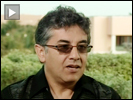
Guests
- Connie HedegaardE.U. climate action commissioner, questioned by Amy Goodman.
WikiLeaks is a hot topic at the U.N. Climate Change Conference in Cancún after secret diplomatic cables revealed new details about how the United States manipulated last year’s climate talks in Copenhagen. The Guardian newspaper reported the cables provide evidence that spying, threats and promises of aid formed part of a U.S. diplomatic offensive to shore up the controversial Copenhagen Accord. Democracy Now! host Amy Goodman questions European Union Commissioner for Climate Action Connie Hedegaard about the account of her discussion with U.S. negotiators on leveraging climate aid to gain the support of vulnerable nations. [includes rush transcript]
Transcript
AMY GOODMAN: We’re broadcasting from Mexico. Here in Cancún, WikiLeaks is also a hot topic after secret diplomatic cables published by the whistleblowing group revealed new details about how the United States manipulated last year’s climate talks in Copenhagen. The Guardian newspaper reported the cables provide evidence that spying, threats and promises of aid formed part of the U.S. diplomatic offensive to shore up the controversial Copenhagen Accord.
One striking example was the case of the Maldives, which was one of the fiercest critics advocating for a robust climate treaty. The cables reveal that in February, two months after the Copenhagen talks, the U.S. deputy climate change envoy, Jonathan Pershing, met the European Union climate action commissioner, Connie Hedegaard, in Brussels, where she told him, quote, “the Alliance of Small Island States countries 'could be our best allies' given their need for financing.” The cables show talks between officials between the Maldives and the U.S. referring to several projects costing approximately $50 million. The Maldives has since wholeheartedly embraced the Copenhagen Accord.
The cables also reveal Hedegaard and Pershing also discussed the issue of “fast-start” funding where the Copenhagen Accord had promised $30 billion in aid for the poorest nations hit by global warming they had not caused. Hedegaard reportedly asked if the U.S. would need to do any “creative accounting” in funding aid pledges.
E.U. climate action commissioner Connie Hedegaard held a news conference yesterday here in Cancún, so I had a chance to ask her about the issue.
AMY GOODMAN: I wanted to ask about the U.S. State Department cable documenting your conversation with Jonathan Pershing that was released by WikiLeaks about the — how the Alliance of Small Island States could be, you said, “our best allies” given their need for financing. This was a conversation you had in February. This is what’s leading many to say you’re talking about blackmail. So you have countries like Maldives, who are fierce critics in Copenhagen, turning around and signing on to the accord when they get tens of millions of dollars from the United States. You also talked about “creative accounting.” Can you explain this conversation?
CONNIE HEDEGAARD: I can only say that what I could read also, and that is a one-sided and selective report of what that conversation was all about. I think that one of the things we have done from the European Union is to try to do a lot of outreach to some of the least developed countries, some of the most vulnerable countries, and for many good reasons, we want to work very much with them. For instance, I went myself this spring to the Maldives to discuss with the Maldives exactly what could be the way forward. A lot of constructive countries, we have been working with them, others we have been working with them, and our conversations definitely is not just about financing.
I’m not going into a lot of detailed things about these WikiLeak documents. You can imagine that there is a conversation. Some of it is sort of reported back home by the one side, but all the elements from the other side is not there, so it makes not a lot of sense to go in and argue a lot about what is in and what is not in. The fact is that we have done a lot of outreach with developing countries, the most vulnerable countries. We are delivering on our financial pledges. And we all know that this is very important also to the credibility of the developed countries here in Cancún.
AMY GOODMAN: That’s European Union climate action commissioner Connie Hedegaard.











Media Options